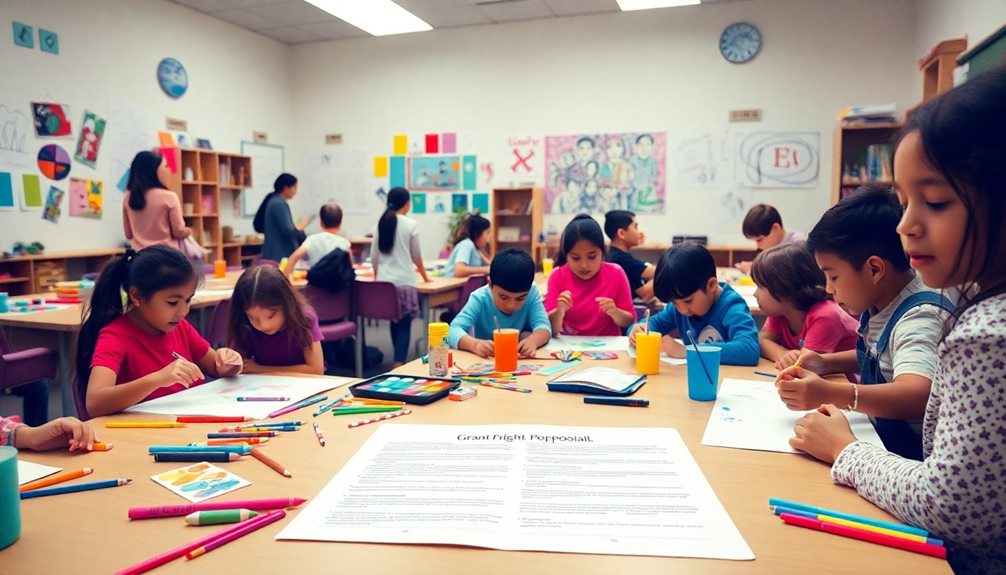Professional development resources are essential for enhancing your teaching effectiveness and adapting to the changing educational landscape. You can explore a variety of online courses and webinars that offer flexibility and valuable training. Join specialized organizations related to your subject area for tailored insights. Networking opportunities, both virtual and in-person, help you connect with fellow educators and share best practices. Consider funded workshops and resources to maximize your professional growth. Engaging with these resources not only boosts your skills but also supports student outcomes. Discovering a wealth of tools and techniques is just the beginning of your professional journey.
Key Takeaways
- Continuous professional development is essential for adapting to career challenges and improving student outcomes through research-based strategies.
- Online learning opportunities, including webinars, provide flexibility and facilitate earning professional development credit hours.
- Networking with professional organizations fosters collaboration and support among educators, enhancing teaching practices and mental well-being.
- Engaging in culturally responsive teaching strategies improves student engagement and acknowledges diverse cultural backgrounds in the classroom.
- Recommended books on differentiation, engagement, and trauma-sensitive practices offer valuable insights for enhancing instructional effectiveness.
Importance of Professional Development

Professional development isn't just a buzzword; it's vital for effective teaching. Quality teachers greatly impact student achievement, influencing performance 2-3 times more than other school factors. That's why continuous professional development is essential for you. It helps you tackle career challenges and adapt to ever-evolving guidelines, technology, and teaching methods.
Engaging in professional development activities—like online courses and workshops—boosts your confidence and expertise. Additionally, exploring Law of Attraction principles can foster a positive mindset that enhances your teaching effectiveness. You'll find that energized and effective classrooms arise from your commitment to learning.
Plus, research-based strategies you gain through these resources can enhance your classroom effectiveness and lead to better student outcomes.
Utilizing diverse mediums for professional development, including literature and even the emerging field of Continuing Education for Healthcare, keeps your teaching practices current and fosters creativity. By tapping into various Professional Development Resources, you can stay informed about the latest trends and methods.
Podcasts for Educators

Podcasts have become a game-changer for educators seeking convenient and dynamic learning opportunities. They provide accessible, on-the-go resources that allow you to engage with diverse topics relevant to your teaching practices and professional growth.
Incorporating techniques from Positive Thinking Day can further enhance your mindset, enabling you to approach challenges with resilience. Whether you're in the car, at home, or on a break, you can tune into conversations that inspire and inform.
Here are a few standout podcasts for educators:
- Teaching Matters: Focuses on effective classroom management strategies and adapting to student changes.
- Lab Out Loud: Delivers insights specifically for science educators, promoting innovative teaching methods.
- Art Ed Radio: Explores creativity and technology in art education, enhancing student engagement.
Additionally, the Teaching Math Teaching Podcast emphasizes effective strategies for engaging math students, providing you with practical tools to improve math instruction.
These podcasts not only enhance your knowledge but also connect you with other Professional Counselors and educators addressing similar challenges.
Recommended Professional Development Books

When you're looking to enhance your teaching, several books stand out for their innovative strategies and engaging approaches.
For instance, "How to Differentiate Instruction" by Carol Ann Tomlinson and "Disrupting Thinking" by Kylene Beers and Bob Probst provide insights into meeting diverse student needs and fostering a love for reading.
Additionally, "Culturally Responsive Teaching and the Brain" by Zaretta Hammond offers valuable connections between neuroscience and effective teaching methods for all learners.
Innovative Teaching Strategies
Innovative teaching strategies can transform your classroom and enhance student learning experiences. To implement effective practices, consider the following recommended reads:
- *How to Differentiate Instruction* by Carol Ann Tomlinson
- *Disrupting Thinking* by Kylene Beers and Bob Probst
- *Culturally Responsive Teaching and the Brain* by Zaretta Hammond
These books offer best practices that cater to the diverse needs of your students. For instance, Tomlinson's work helps you tailor learning experiences, ensuring that every student feels supported.
Beers and Probst focus on enhancing reading engagement through critical thinking, encouraging students to participate in meaningful discussions. Meanwhile, Hammond emphasizes understanding cultural backgrounds, fostering equity within your classroom.
Additionally, *Fostering Resilient Learners* by Kristin Souers introduces trauma-sensitive practices, promoting emotional resilience and supportive environments.
Engaging Student Learning
Engaging student learning is essential for fostering a dynamic classroom environment where all learners thrive. To help you enhance engagement and improve learning outcomes, consider these recommended professional development books.
| Title | Author(s) | Focus Area |
|---|---|---|
| How to Differentiate Instruction | Carol Ann Tomlinson | Tailoring teaching methods |
| Disrupting Thinking | Kylene Beers & Bob Probst | Transforming reading experiences |
| Culturally Responsive Teaching and the Brain | Zaretta Hammond | Recognizing cultural backgrounds |
| Fostering Resilient Learners | Kristin Souers | Creating trauma-sensitive classrooms |
| Better Than Carrots or Sticks | – | Restorative practices in management |
Culturally Responsive Approaches
Culturally responsive approaches are crucial for creating inclusive classrooms that honor every student's background and experiences. By embracing Culturally Responsive Teaching, you can greatly enhance engagement and learning outcomes.
Here are some recommended books that explore this important topic:
- "Culturally Responsive Teaching and the Brain" by Zaretta Hammond: Understand how cultural backgrounds impact learning.
- "For White Folks Who Teach in the Hood" by Christopher Emdin: Explore strategies for building authentic relationships with urban students.
- "Teaching to Transgress" by bell hooks: Challenge traditional methods and advocate for empowering education for marginalized communities.
These books not only provide insights into effective teaching practices but also highlight the significance of cultural relevance in pedagogy.
As you read, consider how these approaches can be integrated into your classroom to create a more inclusive environment. Additionally, think about the connection between education and Family Therapy, as understanding family backgrounds can further enhance your culturally responsive strategies.
Online Learning and Webinars

You've got plenty of online learning opportunities at your fingertips, making it easier than ever to earn professional development credit hours.
By participating in webinars and virtual conferences, you can connect with fellow educators, share resources, and enhance your teaching strategies.
These platforms not only offer valuable training but also keep you updated on the latest best practices in education.
Abundant Online Opportunities
Exploring abundant online opportunities for professional development can greatly enhance your skills as a K-12 educator. With a wealth of resources available, you can engage in online learning that fits your schedule and teaching needs.
Here are some great options to evaluate:
- Webinars that offer insights into innovative teaching strategies.
- Courses tailored to specific subjects, like American history and social justice education.
- Virtual conferences that connect you with experts and fellow educators.
Many specialized organizations, such as the Gilder Lehrman Institute and Teaching Tolerance, provide targeted online professional development resources.
These options not only improve your instructional skills but also offer high-quality materials that are relevant to your subject area. The flexibility of online learning makes it easier to integrate professional development into your busy life, allowing you to learn from any location.
Networking Through Webinars
Webinars serve as a dynamic platform for educators looking to expand their professional network while enhancing their instructional skills. They provide an interactive environment where you can learn from expert speakers and engage with focused topics relevant to your teaching areas.
Organizations like the Gilder Lehrman Institute and Teaching Tolerance offer specialized webinars that explore subjects such as American history education and social justice, allowing you to broaden your knowledge base.
By participating in these webinars, you earn professional development credit hours, all while engaging in real-time discussions with your peers. This networking opportunity is invaluable, as you connect with educators from diverse backgrounds and locations, sharing insights and resources that can enrich your own practice.
Additionally, virtual conferences and online workshops included in webinar offerings further facilitate collaboration. Regularly attending these sessions keeps you up-to-date with the latest teaching strategies, technologies, and best practices in your field.
Embracing webinars not only enhances your skills but also helps you build lasting connections within the educational community. So, engage fully and start networking through webinars today!
Specialized Professional Development Organizations

Specialized professional development organizations play an essential role in enhancing educators' skills and knowledge across various disciplines. These organizations focus on specific fields, providing targeted resources and support that can greatly improve your teaching effectiveness.
Engaging with these organizations can also boost your confidence and self-image, similar to how astrology claims to influence attractiveness.
- SHAPE America: Resources for health and physical education teachers, promoting best practices.
- National Association for Music Education (NAfME): Webinars centered on music pedagogy and curriculum development.
- National Geographic: Immersive experiences and professional development in environmental education.
By joining these associations, you not only gain access to valuable training but also become part of a social network of like-minded educators. This community fosters collaboration and the sharing of innovative teaching strategies.
Whether you're a literature teacher seeking engaging methods from the Folger Shakespeare Library or an educator interested in biodiversity through the Smithsonian Institution, these specialized organizations offer tailored resources to enhance your professional journey.
Embrace the opportunities they provide to stay current in your field and connect with fellow educators passionate about their subjects. Your growth as an educator is just a resource away!
Strategies for Collaboration

Collaboration among educators can considerably enhance your teaching practices and create a supportive community. By engaging in professional development resources like webinars and workshops, you can foster collaboration and share valuable insights with your peers. Here are some effective strategies for collaboration:
| Strategy | Description |
|---|---|
| Join Professional Networks | Connect with specialized organizations to share best practices. |
| Utilize Online Platforms | Engage with educators from diverse backgrounds for new ideas. |
| Participate in Workshops | Collaborate on instructional skills through shared experiences. |
| Develop Interdisciplinary Approaches | Work with colleagues across subjects to boost student engagement. |
These strategies for collaboration not only enhance your instructional skills but also promote a sense of community among educators. By connecting with others, you can address common challenges and develop innovative teaching strategies tailored to your expertise. Embrace these opportunities to create a collaborative environment that ultimately enriches your teaching and benefits your students.
Networking Opportunities for Teachers

Networking opportunities for teachers are essential for building collaborative learning communities that enhance your teaching practice.
By engaging with professional organizations and attending virtual networking events, you can connect with peers, share resources, and stay updated on the latest trends in education.
These interactions not only support your growth but also foster a sense of belonging within the teaching community.
Collaborative Learning Communities
Engaging in collaborative learning communities can transform your teaching practice by connecting you with fellow educators who share your passion. These networks not only foster professional growth but also enhance your instructional practices. By exchanging resources, strategies, and experiences, you create an environment that promotes creativity and excitement in teaching.
- Share innovative ideas and best practices with peers
- Access specialized professional development resources from organizations like SHAPE America and NAfME
- Participate in webinars and virtual conferences to broaden your network
Research shows that teacher collaboration greatly improves student outcomes. So, as you engage in these communities, you're not just enhancing your own skills; you're positively impacting your students' learning experiences.
Additionally, networking can provide crucial support for mental health counseling and therapy resources, ensuring you maintain a healthy work-life balance. By surrounding yourself with supportive colleagues, you'll cultivate a space where well-being and professional development go hand in hand.
Collaborative learning communities are essential for educators committed to continuous improvement and student success. Embrace the opportunities these networks offer, and watch your teaching journey flourish.
Professional Organizations Benefits
Connecting with professional organizations offers teachers invaluable networking opportunities that can greatly enhance their careers. By joining groups like SHAPE America or NAfME, you gain access to exclusive webinars, conferences, and workshops designed specifically for your teaching discipline.
These events not only facilitate ongoing education and skill development but also allow you to connect with peers who share your passion.
Networking through professional organizations opens doors to mentorship opportunities, enabling less experienced teachers to receive guidance from seasoned educators. This connection can greatly impact your professional growth, helping you navigate challenges in the classroom more effectively.
Additionally, membership often grants access to a broader range of professional development resources, including research publications, teaching tools, and even grants for classroom projects.
Engaging with these organizations fosters a sense of community, combating feelings of isolation that educators sometimes face.
Through shared experiences and challenges, you find emotional and professional support, creating a collaborative environment that enriches your teaching journey.
Virtual Networking Events
Virtual networking events are revolutionizing how educators share ideas and resources.
These online gatherings allow you to connect with peers, collaborate on best practices, and access expert insights—all from the comfort of your own home.
Here's why you should consider participating:
- Expert speakers and panels: Gain valuable insights into current trends and challenges in education.
- Diverse interactions: Break geographical barriers and engage with educators nationwide.
- Focus on specialized topics: Join events from organizations like the National Geographic Educator Network, honing in on specific subject areas or social justice education.
E-Learning Providers Overview

E-learning providers are revolutionizing the way healthcare professionals enhance their skills through online continuing education (CE) courses. These providers focus specifically on delivering high-quality CE content tailored to various healthcare professions. Established as a nonprofit educational corporation since 1992, they prioritize minimizing environmental impact while providing a paperless learning environment.
You'll find that their courses are approved by multiple professional boards, ensuring they meet the necessary accreditation standards for continuing education credits. This means you can trust the quality and relevance of the material you're learning.
The flexibility of these online courses allows you to conveniently earn CE credits from home or your office, fitting seamlessly into your busy schedule. Whether you're looking to stay current with industry trends or deepen your expertise in a specific area, e-learning providers have you covered.
Their user-friendly platforms are accessible from any internet-connected device, making it easy for you to engage with the material at your own pace. With a commitment to excellence and professional growth, these providers are essential resources for any healthcare professional seeking to advance their skills through continuing education.
Funding for Professional Development

Investing in your professional development can be made easier with various funding opportunities available to support your growth. Many organizations offer financial assistance for staff to attend workshops, conferences, and courses that enhance your skills and promote career advancement.
Here are some key points to take into account:
- Funding applications often require a proposal detailing how the funds will be used.
- Criteria for funding can vary, catering to diverse professional needs.
- Organizations typically support ongoing learning, increasing your chances of approval.
When applying for funding, be clear about how your proposed activity aligns with your professional development goals. This not only strengthens your application but also demonstrates your commitment to growth.
Additionally, take advantage of any supplementary resources or training programs your organization offers; these can greatly improve your chances of securing funding.
Communication and Support Resources

Effective communication and robust support resources are essential for enhancing your professional development journey. To guarantee you have the best experience, various channels are available for you to engage and seek assistance. You'll find welcome coupons and free course offers, helping you immerse yourself without a hefty commitment. Regular email updates keep you informed about new courses, so you won't miss any opportunities.
Here's a quick overview of the resources available to you:
| Type of Resource | Description | Access Method |
|---|---|---|
| Welcome Coupons | Incentives for new users | Sign-up options |
| FAQs | Quick answers to common inquiries | detailed FAQ section |
| Contact Options | Multiple ways to reach support | Email, phone, or chat |
For any additional support, you can easily reach out through various contact options. The organization prioritizes transparent communication with a clear privacy policy, making sure you feel secure while accessing these resources. With these tools at your disposal, you're well-equipped to enhance your professional development.
Frequently Asked Questions
What Professional Development Needed?
You need professional development that focuses on current educational trends, technology integration, and effective teaching strategies. Engaging in workshops, online courses, or collaborative networks will enhance your skills and boost student engagement in your classroom.
What Is a Professional Development Opportunity?
Did you know quality teachers can influence student performance up to three times more than other factors? A professional development opportunity enhances your skills and knowledge, empowering you to make a significant impact in your profession.
Conclusion
In the ever-evolving landscape of education, your growth is like a vibrant garden waiting to bloom. Embrace the wealth of professional development resources at your fingertips, from insightful podcasts to engaging webinars. Connect with fellow educators and nurture your skills through specialized organizations. With funding options and ample support, you've got everything you need to cultivate your career. So, dig in and watch your potential flourish—you're on the path to becoming the best educator you can be!









